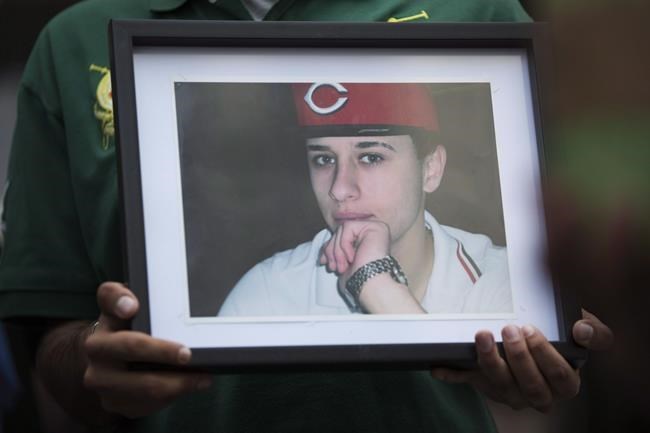TORONTO — The family of a teen who was shot by a Toronto police officer more than a decade ago told a coroner's inquest Friday there should be support to help people like them cope with their loss, noting they are still struggling to come to terms with his death.
Sammy Yatim's mother, father and sister addressed jurors separately on the first day of the coroner's inquest into his death. Each described the pain and sense of emptiness left after Yatim, who was 18 at the time, died on July 27, 2013, and urged jurors to make a recommendation regarding support for grieving families.
Sammy Yatim's sister, Sara Yatim, said she used to dream of babysitting her brother's kids once he was grown and had a family of his own. That dream was shattered abruptly, as was her hope, she said in a statement read aloud by her lawyer.
"For the past 10 years, I have not been well, I still am not well. I fight every single day just to get out of bed," she wrote. "All that for something that happened in less than a minute, for something that could have and should have been avoided."
Officers should take several minutes to assess and de-escalate a situation because it takes so little time to take a life, she said. As well, those who "have been through the same or a similar situation" as her family should receive fully funded mental health support, she said.
Nabil Yatim, Sammy Yatim's father, said families need resources to help them in the aftermath of a "tragic loss."
"We have tragically lost a son and a brother in horrific circumstances. There are no words for a parent that loses a child. There are no words that can properly express the depth of our loss," he said in a statement read by his lawyer.
Sammy Yatim's mother, Sahar Bahadi, described her son as the family's "sunshine," a miraculous first child who was a talented artist and athlete. He made an effort to adapt to his new life in Canada after coming here from his native Syria, and had made friends at his school, she said.
His death paralyzed her, she said. "We were alone, me and Sara, in Canada with a new life, with no support. So it was really very difficult for us, and even until now we needed somebody to help us," she said.
Sammy Yatim was alone on a streetcar, shortly after midnight, holding a small knife when he was shot by then-Const. James Forcillo in two separate volleys of bullets.
Jurors acquitted Forcillo of second-degree murder related to the first round of shots, which court heard had killed the teen. The officer was convicted of attempted murder related to the second volley, fired while Yatim was lying on his back.
Forcillo was sentenced to six and a half years behind bars and was granted full parole in 2020.
An agreed statement of facts presented Friday said a group of officers placed themselves in a semi-circle outside the streetcar door and told Yatim to drop the knife. Yatim did not put down the knife, and some officers called for a sergeant to come with a stun gun.
Moments later, Yatim took a step from the aisle onto the platform by the front door, the statement said. Forcillo fired three times, hitting Yatim and knocking him to the floor with his feet towards the exit.
Yatim was still holding the knife while laying on the floor, and Forcillo continued to yell at him to drop it, the statement said. Six seconds later, the officer fired six more shots, five of which hit the teen.
The entire confrontation lasted about 60 seconds, the inquest heard.
Within 20 seconds of the last shot, a sergeant arrived at the scene and used his stun gun on Yatim, who was still on the floor holding the knife, the statement said.
Other officers handcuffed Yatim, but then removed the cuffs and started CPR when they realized he had no vital signs, it said.
In his opening statement, coroner's counsel Peter Napier said the inquest will explore the mechanisms in place to promote good decision-making skills for police, and best practices in responding to people in crisis.
He said that may include factors such as police recruiting, monitoring of officers, the role of bystander officers during confrontations, the role of supervisors in monitoring officers, and the availability of mental health supports.
However, Napier said the inquest is not meant to re-examine the events of that day, which have been extensively reviewed during trial, or issues such as Forcillo's potential culpability, the investigation by a police oversight body, or the details of the use-of-force model used by police.
Jurors also heard testimony Friday afternoon from the driver of the streetcar, and viewed video footage of the incident from inside and outside the streetcar.
Chad Seymour recalled hearing someone yell "he has a knife" and passengers suddenly rushing towards the front of the streetcar. He said he set off a silent emergency alert and let people off the streetcar at a stop but couldn't leave without putting himself in a vulnerable position.
At some point, he spoke to Yatim, who requested a phone to talk to his dad. Yatim seemed to be "in a bit of a daze," he said.
Seymour said he left the streetcar and came back aboard, but left again as police arrived, leaving Yatim alone on the streetcar.
Under cross examination, he could not recall if he had received any training at that point on how to deal with a person in crisis, though he said that training is now in place at the TTC.
The inquest is not sitting Monday and will resume Tuesday.
This report by The Canadian Press was first published Jan. 12, 2024.
Paola Loriggio, The Canadian Press




